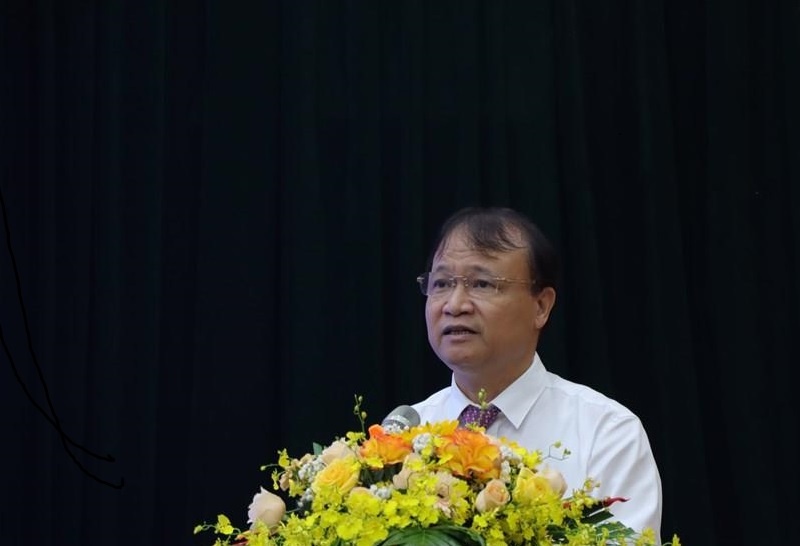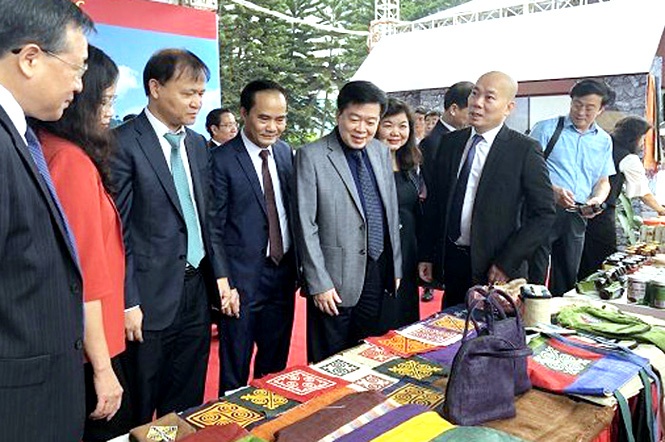 |
| Do Thang Hai, Deputy Minister of Industry and Trade |
Do Thang Hai, Deputy Minister of Industry and Trade, said that the trade connection conference, as well as online and offline fairs, have created thousands of links between Vietnamese enterprises and international buyers in key and potential export markets. “This helps to alleviate difficulties in production and business activities, promote export growth, as well as maintain economic stability in the face of the pandemic,” he said.
Pham Duc Toan, Standing Vice Chairman of Dien Bien People’s Committee, said that the province has formed partnerships with Laos’ northern provinces and China’s Yunnan province to promote import-export activities as well as cross-border commerce.
Some products of Dien Bine like cement, shan tea, coffee, and rubber have been present in the local market as well as exported to Lao’s northern provinces. However, the export volume was not large due to limited production capacity and lack of high-end products.
Dien Bien has joined a trade promotion scheme between suppliers in the north and north-central region with export enterprises and trade promotion organisations initiated by the MoIT and Vietrade. The provincial vice chairman hopes that the MoIT and Vietrade will support Dien Bien to expand its export markets as well as bring its key local products to the shelves of supermarkets and wholesale markets in Hanoi and other localities across the country.
 |
| Several Vietnamese businesses are interested in the trade connection activities organised by Vietrade |
Saigon Co.op has a large demand for goods. Tran Hong Lam, deputy general director of Saigon Co.op said that the company is targeting Japan, South Korea, New Zealand, Australia, Canada, the United States, and Europe. This year, Saigon Co.op continues to promote local products with an increase of about 5-10 per cent depending on the product group.
Lam noted that Saigon Co.op has been maintaining its export activities for Vietnamese agricultural products and processed food with a total value of nearly $3 million. The northern region supplies around 5,000 tonnes per year to Saigon Co.op with 100 suppliers of agricultural products such as Cao Phong oranges, Son La mangoes, and Bac Giang lychees.
Meanwhile, Thailand has reopened its economy, so there is a chance for Vietnam to boost exports of key products to this market. Thailand is Vietnam’s largest trading partner in ASEAN. In the first quarter of 2022, the trade turnover between the country reached $5 billion, up 7.4 per cent over the same period last year.
At present, Vietnam’s products to this market include phones, machinery, spare parts, iron, steel, computers, and electronic products and components.
Le Manh Phong, representative of Central Group, a Thai retail giant, said that the Thai market is not too strict. The most important thing is that Vietnamese companies can meet the demand and tastes of Thai consumers.
According to Phong, Central Retail collaborates with the MoIT and localities to promote the efficiency of trade connection activities, especially focusing on the food retail segment. More and more Vietnamese firms have successfully exported to Thailand such Mr. Viet (coffee), Bibica, Belvie (Socola), Vifon, and Trung Nguyen.
According to the Vietnam Trade Office in Japan, Vietnam is considered a country with strengths in these product categories. Vietnam’s agricultural, aquatic, and food products are increasingly popular with a variety of categories available on the shelves of major supermarket chains in Japan, such as AEON, Donkihote, and Itoyokado.
With the evolving customer tastes, Japanese people are increasingly interested in high-quality products imported from oversea countries, including those from Vietnam. In 2021, Vietnam’s exports to Japan reached $20.1 billion, up 4.4 per cent compared to 2020.
According to Ta Duc Minh, commercial counsellor of the Vietnam Trade Office in Japan, foreign businesses aiming to gain a foothold in the Japanese market need to study and understand the tastes of consumers, thereby diversifying their products, and improving product quality and reducing costs.
Minh said Vietnamese businesses need to show their business cards, catalogues, company profile, and samples to Japanese partners in their first meetings. After establishing a relationship with a Japanese partner, Vietnamese firms need to focus on maintaining a long-term partnership.
According to Vu Ba Phu, director of Vietrade, it is necessary to implement national projects on trade promotion to help Vietnamese enterprises. The projects will promote trade and strengthen domestic supply and demand connections.
 |
| Vu Ba Phu, director of Vietrade |
This year’s programme saw the participation of more than 400 businesses from 23 cities and provinces in the north and north-central region. “We expect to receive much attention from localities, businesses, as well as domestic and foreign trade promotion organisations. The programme is expected to be replicated in other regions, contributing to the development of value chains linking production, distribution, consumption, and export sustainably and effectively,” said Phu.



